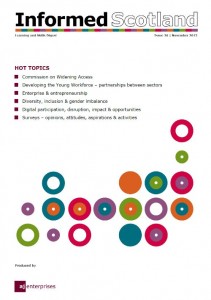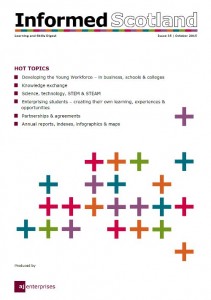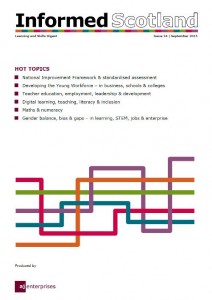Posted by admin on April 11, 2016 ·
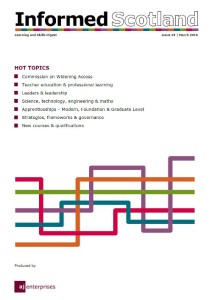
.
It was another particularly busy month with the rush to publish or make announcements before ‘purdah’ began ahead of the Scottish Parliament Elections.
The main publication was the Commission on Widening Access final report, A Blueprint for Fairness. All 34 of its recommendations are included in an annex as a handy reference for our subscribers.
Other items of note include an evaluation of the implementation of the ‘Donaldson report’ on teacher education and development, and an interim report from the Making Maths Count Profile Raising Group.
Plus the launch of Education Scotland’s National Improvement Hub, SQA’s Digital Literacy Learner Guides, and plans for a new Professional Baccalaureate.
There are numerous funding announcements, statistics, new courses and qualifications.
As usual we’ve found some innovative items to highlight, including a new Kiltmakers Academy, a Masters in Comics & Graphic Novels at University of Dundee, a RookieOven start-up academy for 16–19 year-olds, and a dance company in residence at Moray House School of Education.
With the Election looming, we’ll be publishing a very short (unbiased!) Informed Scotland supplement later this month with links to manifestos and resources relevant to learning & skills.
Thanks to Joan Mackay from Education Scotland who last month told us, ‘I approach the arrival and reading of Informed Scotland in much the same way as my 11 year old looks for his Beano’!
Become an Informed Scotland subscriber to keep on top of all the developments. Email [email protected] to request a sample copy.
Posted by admin on March 10, 2016 ·
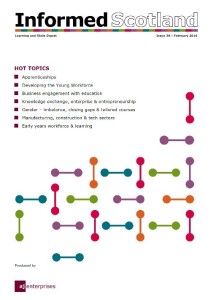
.
During any pre- ‘pre-election’ period there’s always a rush for those in power to make announcements before business goes into temporary stasis. With the Scottish Parliament Elections approaching in May, learning & skills activity has been ramping up for a while; there was no let-up in February.
The Education (Scotland) Bill was passed, and the Scottish Parliament’s Committees were busy publishing reports on Race, Ethnicity & Employment, Work, Wages & Wellbeing, and Post-Study Work Visas.
Scottish Apprenticeship Week took place earlier than usual, presumably to avoid the elections. As well as the latest Modern Apprentice statistics from Skills Development Scotland, there were surveys by Scottish Gas and Prudential, a summary of the role of colleges from Colleges Scotland, and a new APlayer video channel from Apprenticeships in Scotland.
Then there were action plans from Scottish Enterprise on Manufacturing and the Scottish Funding Council on Gender. Plus UCAS’s annual statistics and lots of new courses, centres of excellence, toolkits and partnerships…
Reports worth delving into this month include FSB’s School Ties on business engagement with schools, Nesta & Tech City’s Tech Nation 2016, Eurydice’s review of Entrepreneurship Education in Europe, and NCUB’s Changing State of Knowledge Exchange.
Favourite tweet from a subscriber: @tonyfinnA ‘Well done. Issue 37 is a mine of information.’
Become an Informed Scotland subscriber to keep on top of all the developments. Email [email protected] to request a sample copy.
Posted by admin on February 10, 2016 ·
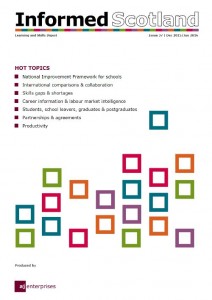
.
Once again there was no festive respite… In fact the opposite was true, with education high on the political agenda it seems everyone in Scotland’s talking about learning and skills. It’s been a mammoth task to make sense of all the activity – Informed Scotland 37 is the biggest issue yet!
A number of major reports were published, in particular the Scottish Government’s National Improvement Framework for Scottish Education.
Then there was the OECD’s Improving schools in Scotland review, the extensive UKCES Employer Skills Survey and the first Developing the Young Workforce annual report.
There were also interesting reports from SCDI (with Royal Society of Edinburgh, ScotlandIS and BT) on Digital solutions to the productivity puzzle and Universities UK on the Supply and demand for higher level skills to mention a couple.
Skills shortages and gaps were highlighted again, with construction, forestry, hospitality, engineering and digital sectors raising particular concerns.
There was a plethora of statistical releases plus new resources, new courses, new centres of expertise and new projects. And look out for UCAS’s new Career Finder and an updated My World of Work from SDS.
As 2016 is Scotland’s Year of Innovation, Architecture & Design, some favourite innovations in this edition are Cumnock Academy and Ayrshire College’s Me2U work experience project, Lingo Flamingo language workshops to tackle dementia, and University of Edinburgh medical students’ You Can Be A Doctor website.
Our third annual Learning & Skills Hottest Topics list is included for a bit of light relief. See how many on the 2015 list you can predict before sneaking a look… There’s also a round-up of another busy year for Informed Scotland.
Become an Informed Scotland subscriber to keep on top of all the developments. Email [email protected] to request a sample copy.
Posted by admin on January 7, 2016 ·

Image is © Andrew Mackie
Here’s our annual list of Learning & Skills ‘Hot Topics’ that made it onto the cover of Informed Scotland over the past year:
1. Developing the Young Workforce (a related topic was 5 in 2014, see below)
2. Digital skills (3)
2. Enterprise & entrepreneurship (-)
4. Partnerships & agreements (2)
4. Raising attainment (6)
4. Science, technology, engineering & maths (STEM) (10)
4. Skills shortages & gaps (4)
8. Widening access (6)
9. Apprenticeships (1)
9. Construction sector skills (-)
9. Gender balance, bias & gaps (7)
9. Knowledge exchange (8)
9. Leadership (-)
9. National Qualifications (-)
The list was produced by fairly unscientific methodology – the position of some items will no doubt prompt debate – but we think it captures most of the main issues last year.
It’s no real surprise to see the Scottish Government’s Developing the Young Workforce (DYW) strategy at the top, featuring on seven of the ten covers in 2015. Although DYW wasn’t on the list in 2014, ‘Work experience, internships & work-related learning’ was 5th and ‘Youth employment & employability’ was 5th in 2013.
‘Digital skills’ has appeared at or near the top for the third year running and we expect it to remain one of the hottest issues in 2016. ‘Leadership’ sneaked onto the list, as predicted. Probably the biggest surprise is that this is the first year ‘Enterprise & entrepreneurship’ has made the list.
Missing from this year’s list is ‘Innovation’ (9th last year), however we have a feeling it will be back next time as 2016 is the Scottish Government’s Year of Innovation, Architecture and Design. Expected to climb up the list are ‘Widening access’, with the Commission due to publish its final report this year, and ‘Raising attainment’ as the Scottish Attainment Challenge is embedded and debate continues on the newly published National Improvement Framework.
What are your predictions for 2016? Let us know what you think – tweet us @InformedScot or comment on the Informed Scotland page on LinkedIn.
Make it your New Year’s resolution to be better informed about what’s happening across learning & skills in business, schools, further & higher education, community & adult learning, and government & wider society. Contact [email protected] to receive a recent sample copy and find out how to subscribe here.
Posted by admin on December 21, 2015 ·

© AJ Enterprises
…to all our clients, associates, suppliers and collaborators; to Informed Scotland subscribers; to contacts old and new; to regular visitors to our website and Calendar; and to our followers on @ajentscotland, @InformedScot and LinkedIn.
Over the last 12 months we’ve had the pleasure of working with and for some great people and organisations – advising, connecting, researching, analysing, evaluating, organising, reporting, writing, copy-editing and proofreading!
We’ve worked on a range of interesting projects for clients close to home in Scotland, further afield in England, and as far away as Ghana and the Caribbean. It’s been a pleasure once again to support long-standing clients such as Education Scotland and Macmillan Education, and new clients including College Development Network, Apex Training & Development, Field Studies Council and EdComs.
It’s been another busy year keeping Informed Scotland subscribers up to date with learning & skills. We produced three Special issues – on Innovation for the Emporium of Dangerous Ideas 2015, on Technologies at Work to support the launch of the Technologies 3–18 curriculum impact report, and our annual Organisations & People directory. We also published four thought-provoking subscriber guest blogs by SCQF Partnership, West Partnership teacher education initiative, EDT Scotland and Clyde Gateway.
We couldn’t have achieved this and more without collaborating with some expert associates. Particular thanks to Janey at Mamook Graphics for Informed Scotland designs, and Lisa at Media Bloom for helping to keep the Learning & Skills Events Calendar updated and for some impromptu and creative picture research! And not forgetting Elaine at emh connect for being a reliable critical friend and information partner in crime!
On a personal level, Angela once again had the opportunity to spend time coworking alongside start-up businesses in Edinburgh TechCube thanks to Allan of Product Forge. Their latest ‘hackathon with a twist’ was on digital participation – if you don’t blink you can catch Angela offering advice to the winning team as one of the mentors.
Our annual look-back at the Hottest Topics in Scottish Learning & Skills will be shared here in January (see what made the Top Ten in 2014).
Email [email protected] for more information about any of the above, to enquire about Informed Scotland, or to discuss how we could support your work in 2016.
Posted by admin on December 10, 2015 ·
A number of common themes run through this month’s issue. Everyone appears to be talking about enterprise & entrepreneurship, has concerns and is trying to do something about the impact of gender imbalance, and is trying to catch up with or ride the wave of the digital skills revolution.
Each month we draw attention to the context for learning & skills in a section on ‘Business confidence & the economy’. November saw the publication of the Aberdeen & Grampian Chamber of Commerce 23rd Oil & Gas Survey and the ScotlandIS Scottish Technology Industry Survey 2015. The stark contrast between the ‘confidence crisis’ of the oil & gas sector and the ‘booming’ technology sector is clearly highlighted, as is their skills needs.
Even the language of the tech sector, particularly start-ups, is energising and enticing – who wouldn’t want to work in an incubator on an accelerator programme for a unicorn!
The main publication was the interim report from the Commission on Widening Access. The areas it will be examining in the second half of its work are included in full in an Annex.
Favourite tweet from a subscriber: @clydegateway ‘fantastic edition this month. As informative and on the ball as ever Angela! Enjoyed the tech sector updates!’
Become an Informed Scotland subscriber to keep on top of all the developments. Email [email protected] to request a sample copy.
Posted by admin on November 9, 2015 ·
The common thread in October was ‘partnership’. Everyone seems to be forging close links with others across all sectors – for knowledge exchange, to share resources and expertise, for research, synergy and employability gains.
Well, almost everyone… It was announced that the long-standing partnership for shared education and social work services between Stirling and Clackmannanshire Councils is due to end.
The theme of enterprising students creating their own learning and work experience continued:
A new Law Clinic is to be run by Edinburgh Napier University students. A planning app, interestingly called Student Sins, has been developed by Robert Gordon University students for their peers in Aberdeen. Get your facts right: a guide to involving young people in social research was produced by Newcastle University with advice provided by Shawlands Academy students. A new student teacher society was launched by University of the West of Scotland students. And an Innovation in Primary Education website was created by University of Strathclyde students.
We’re beginning to think students creating their own opportunities might be an interesting topic for an Informed Scotland Special… What do you think?
Favourite tweet from a subscriber this month: @CEOScel ‘just catching up with issue 34. As always, helpful summary. Thx for inclusion of information re Into Headship & our Framework’
Become an Informed Scotland subscriber to keep on top of all the developments. Email [email protected] to request a sample copy.
Posted by admin on November 2, 2015 ·
 by Natalie Phillips, Project Manager, Education, Business & Community Growth, Clyde Gateway. Continuing our guest blog series featuring Informed Scotland subscribers writing on the theme Making connections across the learning & skills landscape.
by Natalie Phillips, Project Manager, Education, Business & Community Growth, Clyde Gateway. Continuing our guest blog series featuring Informed Scotland subscribers writing on the theme Making connections across the learning & skills landscape.
Clyde Gateway is an urban regeneration company designed to drive inner investment across the east of Glasgow and South Lanarkshire. While that remains of great importance, creating a real life legacy for the local communities is also a key priority and underpins all the work undertaken by myself and the team.
A key part of my role here focuses on forming educational partnerships and creating and facilitating educational initiatives for local primary and secondary schools. It’s fair to say this involvement is both extensive and innovative.
Each year more than £100,000 is spent on a wide range of projects within primary and secondary schools. Over the last four years Clyde Gateway has directly invested around £650,000 on a range of themes and projects in line with Curriculum for Excellence. This funding has enhanced core educational programmes, all of which are designed to promote activities inside and outside the classroom and make valuable contributions to the curriculum.
One of the recent programmes which we have been working hard to pull together with local schools and businesses is the now coveted ‘Hotel & Hospitality Academy’, an innovative programme designed to provide some of Glasgow and South Lanarkshire’s school leavers with work experience and tangible job opportunities. This successful partnership with the Marriott Hotel in Glasgow has now entered its second year.
We didn’t just pick the hospitality sector on a whim. Thorough research was carried out so we know that it’s currently a real growth area, offering those taking part in the Academy real job opportunities.
As of 2015, this programme has been accredited by Skills Development Scotland to deliver Certificate of Work Readiness (CWR) qualifications. Schools have now embedded CWR into the core curriculum, working in partnership with our business partner Glasgow Marriott to obtain a 90 per cent CWR pass rate with 50 per cent of pupils taking part in guaranteed work with the hotel.
The programme is the perfect example of the beneficial results which can be seen when schools and businesses align, helping to create worthwhile initiatives for young people.
We are also set to launch a similar programme towards the end of this year aimed at Primary 5 pupils. The four week project will see learners design a hotel room fit for a school pupil, and organise an event working with various mentors and colleagues from the hospitality sector.
Clyde Gateway always looks to work with the local community and employers to provide learning and future employment opportunities for youngsters in the area; rest assured, we will continue to do so for years to come.
We will look to expand and grow our Hotel & Hospitality Academy over the coming years – but it won’t stop there. Constant evolution is key. We started this programme for secondary pupils, before developing an initiative for unemployed adults, and have future links planned with primary schools. We always look at the bigger picture. We have a lot more planned to benefit the local community, all of which will help to create a real legacy for those across the east end of Glasgow and South Lanarkshire.
For further information contact Natalie Phillips [email protected]
Website: http://clydegateway.com Facebook: ClydeGateway Twitter: @ClydeGateway
Read previous guest blogs in the series, including those from EDT Scotland, SCQF Partnership, UCAS, UKCES and SQA.
Posted by admin on October 9, 2015 ·
September was a very busy month for major announcements, kicked off on day one by the Scottish Government placing education at the heart of its programme for 2015–16.
‘Schools’ is the dominant section of this month’s digest, with everyone seeming to wait for Education Scotland’s annual Scottish Learning Festival to launch new projects and resources.
Main items include the Scottish Government’s Draft National Improvement Framework and Making Maths Count programme; Scottish College for Educational Leadership’s new leadership Framework and Into Headship qualification; Developing the Young Workforce Standards for Career Education and Work Placements; and a consultation on a national Digital Learning & Teaching Strategy.
Once again there are many innovative projects to spot, including Abertay University’s pilot Enterprise Framework, Forth Valley College HND computing students setting up a troubleshooting clinic, and the UK’s first deaf performing arts degree at Royal Conservatoire Scotland.
It’s interesting to observe the impact of social media on names for initiatives, such as this month’s Carnegie UK Trust’s #NotWithoutMe digital skills project and Bauer Academy’s #MissionAmbition media training programme… #justsaying
Become an Informed Scotland subscriber to keep on top of all the developments. Email [email protected] to request a sample copy.
Posted by admin on September 28, 2015 ·
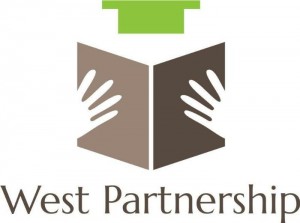 by Tom Greene, Project Advisor and Joanna Holmes, Project Leader, West Partnership. Continuing our guest blog series featuring Informed Scotland subscribers writing on the theme Making connections across the learning & skills landscape.
by Tom Greene, Project Advisor and Joanna Holmes, Project Leader, West Partnership. Continuing our guest blog series featuring Informed Scotland subscribers writing on the theme Making connections across the learning & skills landscape.
Following the publication of Teaching Scotland’s Future in 2011, universities and local authorities were invited by Scottish Government to bid for funding which would progress some, if not all of the recommendations made by Prof Graham Donaldson in his report.
Consequently in late 2013 the University of Glasgow, the University of Strathclyde and nine local authorities – East Dunbartonshire, East Renfrewshire, Glasgow City, Inverclyde, North Ayrshire, North Lanarkshire, Renfrewshire, South Lanarkshire and West Dunbartonshire – submitted a bid.
It requested financial support to appoint a small team which would operate across the consortium to facilitate and enhance partnership working between the stakeholders.
The work of the project team has been directed by an operational group consisting of representatives of both universities and our nine local authorities, with additional support from the professional associations. As well as outlining the scope of the project, a first task for the stakeholders was to come up with a suitable name for the group; and so it was that West Partnership was established.
Initially a strategic vision for the partnership was created. This vision enabled the process of achieving short term gains but also stressed the long term possibilities, particularly with respect to sustainability which the project team might or should address going forward.
Taking our lead from the operational group, but also acting on our own initiative, we set out to research partnership working around the country and beyond to establish whether or not lessons learned elsewhere could have a positive impact on what we were trying to do.
Moreover we worked assiduously to link to and network with other university partnership projects, as well as with a range of other stakeholders including Scottish Government, General Teaching Council for Scotland, Scottish Teacher Education Committee, Education Scotland and Teacher Education Reference Group.
So what have we achieved as a partnership project team? Amongst other things:
- We held a conference for over 50 stakeholders to agree and act on short term targets.
- We have aligned documentation for the PGDE (Postgraduate Diploma in Education) which will be used by both universities and all local authorities for assessment of placement of students from both establishments.
- We have agreed common language, placement timings and dates for PGDE.
- We have showcased our work around the country.
- We have worked to bring harmonisation across our authorities to NQT (newly qualified teacher) activities in the induction year.
- We participated in the Aspect Review of partnership working carried out by Education Scotland.
We believe that West Partnership has made significant progress in facilitating partnership working in teacher education as recommended in Teaching Scotland’s Future; however, much of what we are doing is nascent.
We feel that short term gains have been made but suggest that innovative, sustainable change to teacher learning requires a national approach which emphasises connectedness around the country. The fragmented approach which appears to be the norm at this time, involving partnerships working in isolation from one another, militates against collaboration and cooperation in a wider sense.
For further information contact [email protected]
Website: www.westpartnership.org.uk Twitter @WestPartnership
Read previous guest blogs in the series, including those from EDT Scotland, SCQF Partnership, UCAS, UKCES and SQA.





